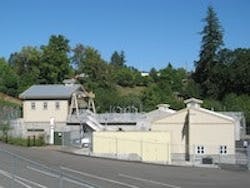Membrane Bioreactor Lowers Operational Expenses in Washington
In 2010, the city of La Center, Wash., retrofitted its sequencing batch reactor (SBR) with a membrane bioreactor (MBR), using as much of the existing tankage, equipment, buildings and other onsite systems as possible. Since then, the MBR has cost the city approximately 15% less than the SBR in terms of its total operating expenditures (OPEX), even though the flow to the plant increased by 15%. Data will be presented on actual OPEX costs for three years of operation for both an SBR (2007 to 2009) and an MBR (2011 to 2013) from the city of La Center, Wash.’s water reclamation facility.
The OPEX evaluation will cover operational costs, including lab testing, chemical costs and solids disposal costs; maintenance costs, including repair and replacement, oil changes, etc.; and utility costs, including electricity, potable water and natural gas usage. Labor costs and overtime have not been significantly affected with the change; however, how the labor is used is different from one system to the other. Since there is no discernible difference in labor costs, it will not be included in the evaluation.
After retrofitting their SBR to an MBR (handling 15% more flow), the total operational costs decreased 25%, the total maintenance costs decreased by 50%, the total utility costs increased a minor 5%, and the total OPEX decreased by 15% on average.
Plans for Energy Optimization
Even though the total OPEX of the MBR is approximately 15% less than the SBR, the city is interested in increasing that delta even more. So, the city has elected to focus on reducing the total energy consumption of the plant. They have contacted the membrane system supplier for input on how to optimize the plant for energy usage. The system supplier has offered to conduct an energy audit of the plant at no cost. Plant energy optimization will be completed in early 2014, so the findings can be tabulated, trended and analyzed for presentation.
Lowered Costs
Being able to compare real OPEX costs, instead of theoretical costs, of two different treatment technologies, validates that MBRs can have a lower cost of ownership than an SBR. Upon completion of the energy audit and optimization strategies, the city expects to see between a 20% and 40% decrease in energy usage, bringing the MBR OPEX even farther below that of an SBR.
